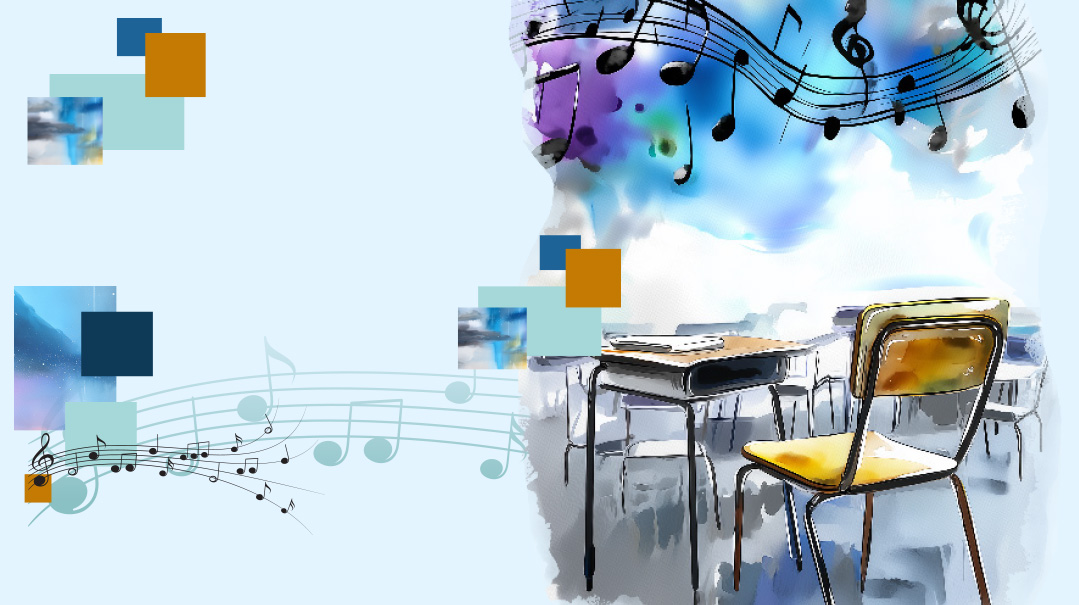The King’s Song
| May 23, 2023As Dovid Hamelech’s song continues to ignite our souls, what’s the niggun you’ve made your own?

Another Tune for Mashiach
YITZI WALDNER
“Mizmor Lesodah” (Single, 2023)
We’re told that in the future all korbanos will be discontinued besides for the Korban Todah, the Thanksgiving Offering. The Radak says that this is because Yidden will no longer be doing any aveiros, and so the sin offerings will not be needed. The mechaber of the Shulchan Aruch writes that similarly, all tefillos will be discontinued except for Mizmor Lesodah, and therefore, this all-important mizmor of gratitude should be said with a melody.
After learning that every “Mizmor Lesodah” written will be around when Mashiach arrives, I was moved to compose my own and sing it at my daughter’s wedding. I feel blessed to have had the opportunity for this new release, a chance to connect with the song that will always be with us, even when Redemption comes.
Help from Nowhere
JOEY NEWCOMB
“Me’ayin Yavo Ezri” (from the album To Be a Yid)
I was sitting in Yeshiva Ateres Shimon when we came across a piece in the Sefer Noam Elimelech which explains the word “me’ayin” as meaning “from nothing,” as opposed to the way it’s usually translated, as “from where.”
According to this, Dovid Hamelech is saying “me’ayin yavo ezri — my help comes from a place called ‘ayin,’ a place of nothingness and of bittul, when there is nothing to turn to but Hashem.” I was blown away by this new understanding, and I immediately got some people together and composed this niggun. I asked everybody to have their own thoughts about a time when they experienced a situation where they felt a level of “ayin,” that there is nothing at all besides Hashem.
Later, I found this idea in many other sources, including the Kedushas Levi’s explanation of “B’ein meilitz yosher,” and also offered by the talmidei HaGra.
Not too long after I released the song, someone called me up and described how he and his daughter, who was having a hard time finding a shidduch, were sitting in the car after another unsuccessful dating experience and crying while they listened to the song together. He called to tell me that both of them found comfort in this song and this concept. It wasn’t too long afterward that the father informed me his daughter was engaged. For all I know, maybe I wrote the song only for this Yid.
Even When We Stray
BERI WEBER
“To’isee K’seh Oveid” (from the album Ben Melech)
This song, from the last verse of kapitel 119, is one composition that I’m very attached to. Dovid Hamelech is so honest and vulnerable here, but even as he’s admitting that he is lost, like a sheep that has wandered off, he’s assuring his master that he hasn’t strayed intentionally, and he hasn’t forgotten how he is supposed to behave — “ki mitzvosecha lo shachachti.”
This message is critical, especially in our generation where we see such a big divide between where we know we should be and our actual behavior. We have to keep reminding ourselves that we are only sheep in a flock being led by our Master. We may stray, but we still belong to the flock. Our shepherd knows what is best for us, and we need to keep that connection, always wanting to come back and stay close. With these words, we can tell Hashem how we feel about all our mistakes, and at the same time give ourselves the much-needed reassurance that we are strong at our core, and should never give up on praying for our future.
Of the Rising Sun
YITZY BERRY
“Mimizrach Shemesh” (Pini Einhorn, Bamistarim)
One morning this past Chol Hamoed Succos, I attended a special davening where Pini Einhorn was the chazan for Hallel. I remember how, as he was saying the words “Mimizrach shemesh ad mevo’o mehullal Shem Hashem — From the rising of the sun until it sets, the name of Hashem is praised,” I was looking out at the beautiful view of the mountains of Yerushalayim, and I thought to myself that I’d love to express in song the thought that we can always find a reason to praise the Creator, when we feel the rising of the sun and even when we feel it’s going down.
I went home after that and sat down at the piano. I started with the well-known nusach of the brachah on Hallel, to emphasize the emotion of Hallel and gratitude, and composed a song on these words. The next time Pini was in the studio, I played it for him. He loved it and asked to record a demo vocal of the song. It was only after that that I let him know he had inspired me to write it.
No More Delays
PINKY WEBER
“Tefillah Le’ani” (MBD, Hameshorerim)
I saw in a sefer that Reb Shmelke of Nikolsburg offers an explanation of this pasuk — “Tefillah le’ani ki ya’atof” — from Tehillim 102. The Gemara describes Mashiach as an “ani,” a poor man, who will come riding on a donkey. Reb Shmelke explains that “ki ya’atof” is an expression of being delayed. He understands the pasuk to mean Tefillah — a Yid should pray, “le’ani” — for Mashiach, “Ki ya’atof” — because he is delayed, and he should pour out his heart before Hashem. When I learned that pshat, I took those words and the niggun came to me. When Mordechai Ben David sang it, we had both a song and a prayer.
Dancing in the Rain
SHLOMO SIMCHA
“Ahalel Devaro” (Single, 2022)
One pasuk in Tehillim that resonates with me very strongly is from Tehillim 56: “B’Elokim ahallel davar, B’Hashem ahallel davar — With Hashem, I will praise His words.”
During Covid we were afforded time that we don’t usually have. When I would say Tehillim during that time I used a Sefer Tehillim that had midrashim printed along the sides, and I came across a fascinating midrash on these words: Dovid Hamelech tells Hashem that whether he experiences Middas Hadin (“Elokim”) or mercy (“Hashem”) he will sing G-d’s praises regardless.
I was overcome with emotion when I read this, as I felt that it captures the essence of the entire Tehillim. No matter what trials and tests Hashem put Dovid through, he sang, because he knew it was ultimately good. It changed my attitude toward Covid and it put into perspective what I heard from Rabbi Y. Y. Jacobson at the beginning of the pandemic: “It’s not about getting to the other side, it’s about learning to dance in the rain.” Dovid Hamelech danced in the rain. I was so inspired that I called up Yitzy Waldner and shared my inspiration with him, and he masterfully came up with a song to those words. When I played “Ahalel Devaro” to Yitzi Berry and Eli Klein, they were so excited that they wrote an arrangement and prepared a music track within two hours.
You Made Me Dance
YISROEL LAMM
HASC Overture
The theme for the HASC 2002 Concert was “United We Stand.” The country was just starting to recover from the 9/11 attacks that would change America forever, and the mood was becoming more optimistic. At the time, the atmosphere reminded me of the pasuk in Tehillim 30, “Hofachta mispedi lemochol li — You turned my lament into dancing.” This pasuk had always been a reminder to me to maintain optimism.
We had a very large symphony orchestra for that concert, and when I wrote the overture, I was inspired by that pasuk. The piece began with a slow, somber melody, and then erupted in triumphant victory toward the end. It was made even more dramatic with the huge orchestra we were fortunate to have on stage.
A Living Book
BENNY FRIEDMAN
“My Sefer Tehillim” (from the album Hallel)
I grew up listening to the Hallel album, produced by Gal Paz in the late 1980s, and since I was a little kid, I always loved this song. For me, it turned the book of Tehillim, which first seemed to me like an inanimate object, just a book among books, into a living thing that could feel a person’s pain and emotions and offer comfort. “My friend my Tehillim…” was a heartwarming line that accompanies me and rings deeply true, even after all these years.
Words of Illumination
CHAIM BANET
“Ner Leragli” (Chaim Banet, Otzar Haneginah)
It was almost 50 years ago, when I was a rebbi in a cheder in Haifa. One morning, I saw that the rebbi of the class next door to mine had hung a big sign on his wall with the words “Ner leragli devarecha…” from Tehillim 119.
I asked him about it, and he told me that he had made the sign for the class’s Chumash party the next day. And then he had an idea: “Maybe you could write us a song?”
“For tomorrow?! I can’t promise.”
But Hashem helped, and at the next day’s party, the choir sang “Ner Leragli.”
It took time, but the song eventually became a hit.
Transformed
SHEYA MENDLOWITZ
“Omdos Hayu Ragleinu” (from the album Sdei Chemed L’shana Haba)
When I first learned this song, I was a young kid who had never been to Yerushalayim. But the song drew me toward the atmosphere of the Holy City, with the words from Tehillim 122 painting a picture of what it will be like when we finally return and stand within its gates, transformed by its holiness.
(Originally featured in Mishpacha, Issue 962)
Oops! We could not locate your form.







